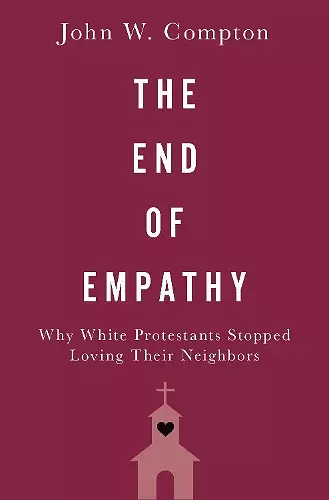The End of Empathy
Why White Protestants Stopped Loving Their Neighbors
Format:Hardback
Publisher:Oxford University Press Inc
Published:8th Oct '20
Should be back in stock very soon

When polling data showed that an overwhelming 81% of white evangelicals had voted for Donald Trump in the 2016 presidential election, commentators across the political spectrum were left aghast. Even for a community that had been tracking further and further right for decades, this support seemed decidedly out of step. How, after all, could an amoral, twice-divorced businessman from New York garner such devoted admiration from the most vociferous of "values voters?" That this same group had, not a century earlier, rallied national support for such progressive causes as a federal minimum wage, child labor laws, and civil rights made the Trump shift even harder to square. In The End of Empathy, John W. Compton presents a nuanced portrait of the changing values of evangelical voters over the course of the last century. To explain the rise of white Protestant social concern in the latter part of the nineteenth century and its sudden demise at the end of the twentieth, Compton argues that religious conviction, by itself, is rarely sufficient to motivate empathetic political behavior. When believers do act empathetically--championing reforms that transfer resources or political influence to less privileged groups within society, for example--it is typically because strong religious institutions have compelled them to do so. Citizens throughout the previous century had sought membership in churches as a means of ensuring upward mobility, but a deterioration of mainline Protestant authority that started in the 1960s led large groups of white suburbanites to shift away from the mainline Protestant churches. There to pick up the slack were larger evangelical congregations with conservative leaders who discouraged attempts by the government to promote a more equitable distribution of wealth and political authority. That shift, Compton argues, explains the larger revolution in white Protestantism that brought us to this political moment.
Compton seeks to explain support for Donald Trump among American Protestants, suggesting that the empathy religious voters had previously demon-strated for underprivileged groups had been compelled by mainline Protestant churches that, beginning in the 1960s, increasingly lost members to evangelical churches opposing government efforts to more equitably distribute wealth and political power. * Survival: Global Politics and Strategy *
Why are white evangelicals so supportive of Donald Trump, when in the past evangelicals were often on the side of progressive social reforms? Many have attempted to answer that question by looking only to the present. In this book John Compton takes a longer view, convincingly arguing that the Religious Right emerged to fill the vacuum left when mainline Protestantism lost its authoritative voice in American public life. This book is required reading for anyone trying to make sense of the contemporary American religious landscape. * David Campbell, Packey J. Dee Professor of American Democracy, University of Notre Dame *
As a former pastor who spent my life in the milieu described in John Compton's new book, I read with it with both personal and professional interest. Well-written and energetically researched, The End of Empathy overturned several of my previously settled assumptions, and forced me to see many of my own struggles and perplexities in a new light. Most importantly, it convinced me that evangelical leaders of the Religious Right have not actually been religious leaders; rather, they have been social mirrors, following their white flocks into a form of backlash politics that reflects their racial anxieties and resentments. An important book, especially in this conflicted time. * Brian D. McLaren, author of The Great Spiritual Migration *
In this compelling contemporary history, John Compton marshals a wide range of evidence to argue that it is the decline, not the enhanced influence, of religious authority in their day-to-day lives that drives racial resentment and other conservative political characteristics associated with white evangelicals today. * Janelle Wong author of Immigrants, Evangelicals, and Politics in an Era of Demographic Change *
- Winner of Honorable Mention, Hubert Morken Best Book in Religion and Politics Award, American Political Science Association.
ISBN: 9780190069186
Dimensions: 160mm x 236mm x 36mm
Weight: 680g
408 pages